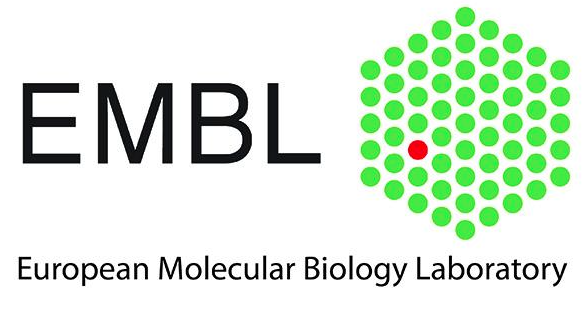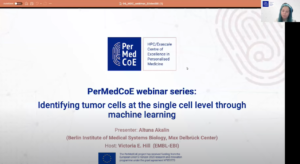For her PIPS, Victoria worked within the training team at EMBL-EBI (European Molecular Biology Laboratory, European Bioinformatics Institute) based in Cambridge. EMBL-EBI is an international organisation that handles big biological data for scientific discoveries.
The featured image is of the EMBL-EBI logo
What did you do?
I worked with the EU projects team who are one of the managing partners for large centres of excellences and projects such as BioExcel, PerMedCoE, and RITrainPlus. My role during this time was to provide learning and career development support to professionals in computational biomolecular research. As somebody working in this field, it was an invaluable opportunity.
I was lucky enough to be involved with a number of exciting projects, from writing career profiles and a learning pathway for EBI’s new Competency Hub, to organising and hosting virtual courses and webinars, and writing content for social media. I was responsible for a couple of courses and webinars myself for which I had to create all of the course materials and facilitate discussions during the course itself; and I also worked with a small team of organisers for larger courses where, along with creating course materials, I was also involved in the selection of participants and organising social sessions. During the courses, I was an ‘expert’, which meant that I wrote-up notes from the open discussion sessions for the participants to refer to later, and also was on a panel of early career researchers for a discussion on careers in computational biomolecular research. Organising these courses and being present during them mean that I also learnt a lot regarding the software and methods that I use during my own research. I was also a useful inclusion for EMBL-EBI to their Training Team, as I was able to offer insight and opinions as one of their main target audiences for their courses.
My placement coincided with a project that is nearing its end of funding. This allowed me to be part of larger discussions regarding funding and I was also responsible for report-writing for project deliverables. Overall, it gave me a unique insight into how large project grants are managed in such an institution. I was also able to network with many researchers in my field that work on these projects from course trainers to software developers and internationally recognised researchers.
How did you find this placement?
I have been to a course organised by EMBL-EBI during the first year of my PhD and during that course, the participants were asked if they would like to get involved in testing a new learning pathway for their training website, which I did. When I started thinking about what to do for my PIPs, I then decided to contact the organiser of that course myself, who I had been in contact with already thanks to my testing of the training materials. She was happy to take me within the team as an intern and we then went on to discuss what activities I would like to do.
What made you want to do that particular placement?
Firstly, because I approached the host organisation myself, I was able to decide myself, to a certain extent, what I would like to do on my placement. Also, as my research is mostly computational based, working within bioinformatics would definitely provide me with valuable experience for my future career. When I was thinking about what to do for my PIPS, I thought about the areas that I would like to improve in, mainly communication as well as some actual research skills. This was therefore the perfect place to work on both of these.
What did you gain from your PIPS placement?
Working on the Competency Hub has taught me what competencies are and, importantly, how they can be used at my career stage. Mapping competencies to career profiles has given me the opportunity to reflect upon my own training needs and I will be sure to use the competency model to aid my own professional development going forward. The Competency Hub project is highly collaborative and involves a number of different teams within EMBL-EBI and externally. From this, I have gained perspective on different ways of managing a project, which can be directly applied to my research. I would say that my biggest improvement during my placement was surrounding communication and social media, which was an area that I wanted to work on when I started planning my PIPS. I have gained insight into how to communicate recent news in my field to different audiences as well as how to promote research and learning opportunities through social media. Owing to this, I now feel more confident in the wider area of science communication. Before my project, I was nervous about public speaking and hated giving presentations. Now, although I may not enjoy them, due to how much I had to present to my team and external partners and course participants, I feel much more capable which helps my confidence. Working in a more hybrid academia/industry setting gave me the opportunity to see new ways of working and the differences and similarities between the two. I now understand much better how I work best and how to translate that to managing my PhD project.
How would you sum up your PIPS placement?
I think my PIPS placement was especially useful for my professional development. It has not only allowed me to identify areas that I need to work on going forward but has also given me the tools that I need to do so. Having the opportunity to talk to so many researchers in my field, from PIs to Post Docs and PhD students, has given me many opportunities to think about my future career and I now feel more certain about what I want to do following my PhD.
What advice would you give to other PGRs about PIPS?
Don’t be tempted to work on your PhD throughout your placement! As my placement was virtual and my research is mainly computational based, this would have been very easy for me, and it was something that I had planned to do. However, I actually was too busy to look at my research for the whole three months and I found it to be a very refreshing break. I am probably now more excited and ready to get back to my research than if I had continued working.
Want to find out more? Victoria has posted numerous blog posts about her experience on this PIPS placement. See links below.
In Focus with Victoria Hill: International Day of Women and Girls in Science


